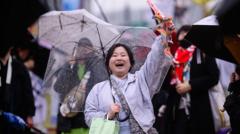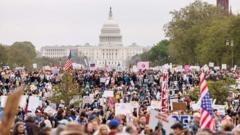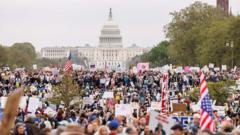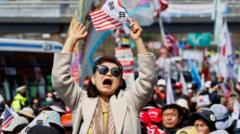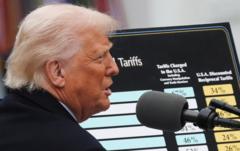South Korea's political landscape shifts dramatically as President Yoon Suk Yeol is impeached, prompting diverse reactions from citizens, lawmakers, and political factions.
**Impeached: South Korea's President Yoon Suk Yeol Removed From Office**

**Impeached: South Korea's President Yoon Suk Yeol Removed From Office**
The Constitutional Court's decision sparks celebrations among protesters while raising questions about governance and constitutional law in South Korea.
South Korea's Constitutional Court has officially upheld the impeachment of President Yoon Suk Yeol, culminating in his removal from office just four months after he imposed a controversial martial law. This decision was announced on a Friday morning after a lengthy deliberation process involving all eight justices, who unanimously agreed that Yoon had "betrayed the trust of the people" and "severely violated the law."
As news of the ruling spread, crowds of protesters celebrated in the streets of Seoul, waving flags and expressing their relief and joy at the court's decision. Since the announcement of Yoon's martial law on December 3, protests for and against his leadership have surged, demonstrating the country's deep political divisions. Protesters had long argued that Yoon's actions were unconstitutional and threatened the democratic framework of South Korea.
During the brief martial law that lasted only six hours, Yoon controversially sent troops to the National Assembly in an attempt to subdue opposition lawmakers, leading to confrontations with citizens who resisted military intervention. The quick backlash from lawmakers and citizens resulted in a swift overturning of his decree. Justice Moon Hyungbae clarified in the ruling that Yoon's martial law declaration did not fulfill the constitutional requirements necessary to invoke such emergency powers.
The ruling has immediate effect and cannot be appealed, sending ripples through the South Korean political spectrum. Yoon's People Power Party has since acknowledged the court's ruling, stating they "humbly" accept the decision. This event is likely to prompt new conversations around the limits of presidential power in Korea, especially considering the implications for future governance and the response from various political factions moving forward.
As news of the ruling spread, crowds of protesters celebrated in the streets of Seoul, waving flags and expressing their relief and joy at the court's decision. Since the announcement of Yoon's martial law on December 3, protests for and against his leadership have surged, demonstrating the country's deep political divisions. Protesters had long argued that Yoon's actions were unconstitutional and threatened the democratic framework of South Korea.
During the brief martial law that lasted only six hours, Yoon controversially sent troops to the National Assembly in an attempt to subdue opposition lawmakers, leading to confrontations with citizens who resisted military intervention. The quick backlash from lawmakers and citizens resulted in a swift overturning of his decree. Justice Moon Hyungbae clarified in the ruling that Yoon's martial law declaration did not fulfill the constitutional requirements necessary to invoke such emergency powers.
The ruling has immediate effect and cannot be appealed, sending ripples through the South Korean political spectrum. Yoon's People Power Party has since acknowledged the court's ruling, stating they "humbly" accept the decision. This event is likely to prompt new conversations around the limits of presidential power in Korea, especially considering the implications for future governance and the response from various political factions moving forward.


